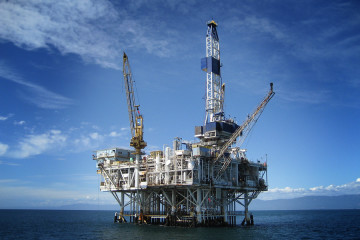Clinton Caught in Trap Set by Fracking Activists: Paula Dwyer

published Apr 12th 2016, 1:35 pm, by Paula Dwyer
(Bloomberg View) —
Fractivists — the environmentalists who oppose hydraulic fracturing to produce natural gas — mean to make trouble for Hillary Clinton in the coming New York and Pennsylvania primaries.
New York, which votes on April 19, bans the practice for fear it could contaminate drinking water. Pennsylvania, which votes on April 26, allows fracking; it has created tens of thousands of jobs and revitalized the state’s economy.
Clinton, as on many other issues, is no absolutist when it comes to staking out a position. She favors the New York ban, while calling for strict regulation of the practice in Pennsylvania and other states that allow it. The fractivists think she’s just trying to have it both ways.
They’re pushing her to condemn fracking, as Bernie Sanders vocally does, and to oppose the construction of pipelines that carry the gas, too. “Bernie Sanders is the only candidate for president who opposes fracking everywhere,” the actress Susan Sarandon narrates in a new ad released by the Vermont senator’s campaign.
QuickTake Fracking
Such a position might placate New York Democrats, but alienate voters in Pennsylvania, which could be a swing state in the general election. The shale-gas boom there, while in retreat because of the collapse in oil prices, created about 60,000 jobs in the state from 2007 to 2014. One study estimates that per-capita income increased from 12 percent to 19 percent in counties with wells, versus only 8 percent in counties without them.
A fracking ban and pipeline moratorium could hurt consumers nationwide as well as Pennsylvanians. The majority of U.S. households use natural gas for heating, air conditioning or cooking. In the last decade, fracking has resulted in a 40 percent increase in gas production and a 70 percent decrease in prices.
The environmental case against fracking isn’t black and white, by any means. Opponents say the technique is polluting drinking water and increasing carbon emissions through leakage of methane gas into the air. The process typically involves injecting into a cement-encased well more than a million gallons of water, sand and chemicals, some of which are carcinogenic, at high pressure to pulverize shale rock and thus release natural gas.
A five-year Environmental Protection Agency study, released in June, revealed specific cases of drinking-water contamination from fracking. But the report concludes that they “have not led to widespread, systemic impacts to drinking water resources.” The number of contamination cases, the EPA also said, is small relative to the number of wells. From 2011 to 2014, fracking occurred at about 30,000 new sites annually.
The biggest problem seems to occur when the liquid from fracking spills above ground — from trucks carrying away waste or from equipment failure at the well. The EPA estimated that such spills occurred from 0.4 to 12.2 times per 100 wells. Of 151 chemical spills the agency examined, 13 reached the surface water, 97 were detected in the soil, and none reached groundwater (though monitoring continues).
The EPA report didn’t address leaks of methane, a potent greenhouse gas, into the air. But last month the agency began the process of proposing rules to reduce methane emissions as part of President Barack Obama’s climate action plan.
All of this suggests that Clinton’s approach is the right one: Yes, fracking potentially can harm public health, but with the right regulations and state and federal oversight, it’s possible to reduce the risks — without forbidding the technique altogether.
The anti-fracking movement, however, insists that Clinton commit to a ban, promise to end fossil-fuel extraction on public lands and oppose construction of pipelines. Specifically, they want her to help derail the 124-mile Constitution Pipeline to carry gas from the Marcellus Shale fields of Pennsylvania to New York and New England. If the drillers can’t sell the gas out of state, they won’t drill more wells, the theory goes.
Clinton prefers not to ban fracking or block new pipelines, and instead sees natural gas, which emits half the carbon dioxide of coal, as a bridge to a renewable-energy future. To her, shale gas is the lesser of evils, especially compared with coal. For nearly six months last year, she avoided taking a position on the Keystone XL Pipeline, which would have carried Canada’s tar-sands oil to the U.S. Gulf Coast. In September she announced her opposition — six weeks before President Barack Obama rejected the project.
She may be straddling these issues, but her views are in line with those of Americans broadly, whose appreciation of fracking seems to rise and fall with oil prices. A March 2-6 Gallup poll found that 51 percent of Americans oppose it, up from 40 percent a year ago. Lower oil prices may have a lot to do with the loss of support. After all, why fracture the earth and take the chance of polluting the air and water if the country is brimming with cheap energy?
But state fracking bans would reduce shale-gas supply and push up fossil-fuel prices, to the detriment of lower-income households, and possibly increase the use of coal. Energy companies that shut wells or delayed drilling new ones would resume production if prices rose high enough to justify the cost.
Opponents of fracking can point to some great successes with wind, solar and other renewable sources due to subsidies and other favorable government policies. But major breakthroughs in electric batteries for cars and electric-grid storage, along with carbon taxes, are still needed to make renewable energy widespread.
Right now, fewer than 1 percent of U.S. residences are solar-powered, and only 11 percent of U.S. energy production comes from renewable sources.
Even if they could end fracking tomorrow, fractivists can’t abolish the laws of economics.
This column does not necessarily reflect the opinion of the editorial board or Bloomberg LP and its owners.
To contact the author of this story: Paula Dwyer at pdwyer11@bloomberg.net To contact the editor responsible for this story: Katy Roberts at kroberts29@bloomberg.net
For more columns from Bloomberg View, visit Bloomberg view
copyright
© 2016 Bloomberg L.P







No Comment